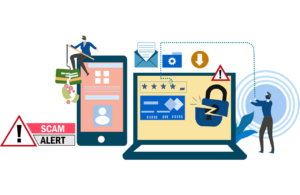Beware the Tax Scammers: 12 Ways They’ll Try to Steal Your Refund
As tax season approaches in 2025, it’s crucial for US citizens to be aware of the increasingly sophisticated scams targeting taxpayers. Fraudsters are constantly refining their tactics, using advanced technologies and exploiting current events to deceive unsuspecting individuals. This article will explore the 12 biggest tax scams to watch out for and provide actionable steps to protect yourself.

#1 IRS Impersonation Phone Call
One of the most prevalent scams is the IRS impersonation phone call. Scammers pose as IRS agents, claiming you owe back taxes and threatening legal action if you don’t pay immediately. They often use caller ID spoofing to appear legitimate and may even have some of your personal information. Remember, the IRS will never initiate contact via phone demanding immediate payment or threatening arrest. If you receive such a call, hang up and report it to the Treasury Inspector General for Tax Administration.
#2 IRS Impersonation Phishing emails
Another common tactic is phishing emails and text messages. Criminals send messages that appear to be from the IRS or tax preparation services, often using AI to create highly convincing content. These messages may claim there’s an issue with your tax return or offer a larger-than-expected refund. They typically include links to fake websites designed to steal your personal and financial information. To protect yourself, never click on links in unsolicited emails or texts claiming to be from the IRS. The IRS will not initiate contact through these channels.
#3 Identity Theft for Fraudulent Tax Refunds
Identity theft for fraudulent tax filings remains a significant threat. Criminals use stolen personal information to file false tax returns and claim refunds in your name. To combat this, file your taxes as early as possible and use a IRS PIN (Personal Identification Number) provided by the IRS for additional security. Be cautious about sharing personal information online and regularly monitor your credit reports for suspicious activity.
#4 Fake Tax Preparers or “Ghost Preparers”
Fake tax preparers, or “ghost preparers,” are another growing concern. These individuals may promise unrealistically large refunds or charge fees based on a percentage of your refund. They often manipulate your tax information to inflate refunds and may disappear with your personal data. Always verify the credentials of tax preparers, including their Preparer Tax Identification Number (PTIN), and be wary of those who refuse to sign the returns they prepare.
- The Directory of Federal Tax Return Preparers with Credentials and Select Qualifications can help taxpayers find a tax pro who meets high standards.
#5 The “Federal Student Tax” Scam
The “Federal Student Tax” scam targets students and parents by demanding payment for a non-existent tax. Remember, there is no such thing as a Federal Student Tax. If someone contacts you about this or any other unfamiliar tax, it’s likely a scam.
#6 Fake Charity Scams
Fake charities are particularly active during tax season, exploiting people’s desire to make tax-deductible donations. Scammers create organizations with names similar to legitimate charities and pressure individuals to make immediate donations. Before donating, verify the charity’s legitimacy through the IRS’s Tax Exempt Organization Search tool.
#7 Economic Stimulus Payment Scam
The Economic Stimulus Payment scam has gained traction in recent years. Fraudsters send text messages or emails claiming you’re eligible for a stimulus payment and prompt you to click on a link to provide personal information. Be aware that the IRS will not contact you about stimulus payments via text or email.
#8 Refund recalculation scams
Refund recalculation scams involve criminals contacting taxpayers about a supposedly larger refund they’re entitled to receive. They ask for personal information to “process” this refund. Remember, if the IRS needs to contact you about your refund, they will do so by mail.
#9 Tax Debt Relief Scam
The tax debt relief scam targets individuals who owe back taxes. Scammers promise to significantly reduce or eliminate tax debt for an upfront fee. In reality, they take your money and disappear. If you owe taxes, work directly with the IRS or consult with a reputable tax professional.
#10 Criminals Already Have Your Data
Data breaches pose a significant risk during tax season. Criminals can use stolen data to file fraudulent returns or commit other forms of identity theft. Protect yourself by using strong, unique passwords for all accounts, enabling two-factor authentication where possible, and being cautious about sharing personal information online.
#11 Documentation Verification Scams
Verification scams involve criminals posing as IRS agents or tax preparers requesting photos of sensitive documents like driver’s licenses and W-2 forms. The IRS will never ask you to send such information via email or text.
#12 Anti-Social – Social Media Scams
Social media platforms have become a new frontier for tax scammers. Fraudsters use fake profiles or hacked accounts to promote “secret” tax loopholes or fraudulent investment opportunities. They may also share phishing links disguised as tax-related information. Be skeptical of any tax advice or offers on social media, and always verify information through official IRS channels.
To protect yourself from these scams:
– File your taxes early to prevent fraudsters from filing in your name.
– Use strong, unique passwords and enable two-factor authentication on all accounts.
– Be wary of unsolicited communications claiming to be from the IRS.
– Verify the legitimacy of tax preparers and charities before engaging with them.
– Never share sensitive personal or financial information over the phone, email, or social media.
– Use secure, encrypted methods when sharing tax documents electronically.
– Stay informed about current scams by regularly checking the IRS website and other reputable sources.
By staying vigilant and following these guidelines, you can significantly reduce your risk of falling victim to tax-related scams. Remember, if something seems too good to be true or creates a sense of urgency, it’s likely a scam. When in doubt, contact the IRS directly through their official channels to verify any claims or requests.
Robert Siciliano CSP, CSI, CITRMS is a security expert and private investigator with 30+ years experience, #1 Best Selling Amazon author of 5 books, and the architect of the CSI Protection certification; a Cyber Social Identity and Personal Protection security awareness training program. He is a frequent speaker and media commentator, and CEO of Safr.Me and Head Trainer at ProtectNowLLC.com.

 Similar vacant land scams have been reported throughout the United States. Do not assume that this warning does not apply if you are not in California. Every real estate agent should understand how the scam works, and how to spot the red flags of a potentially fraudulent transaction.
Similar vacant land scams have been reported throughout the United States. Do not assume that this warning does not apply if you are not in California. Every real estate agent should understand how the scam works, and how to spot the red flags of a potentially fraudulent transaction.
 Martina Dove, Ph.D., is a senior UX researcher at Tripwire and an expert in fraud psychology. Her research into the brain’s reaction to cyber scams and how the human mind operates when presented with a scam makes for an interesting read. On top of this, it also takes a look at fraud, and how susceptible we are to it, and it does this by using Dove’s own model.
Martina Dove, Ph.D., is a senior UX researcher at Tripwire and an expert in fraud psychology. Her research into the brain’s reaction to cyber scams and how the human mind operates when presented with a scam makes for an interesting read. On top of this, it also takes a look at fraud, and how susceptible we are to it, and it does this by using Dove’s own model. Basically, if you are a person who is registered for a conference, if you are a conference vendor, or if you are speaking at a conference, you might receive an email…or a number of emails…that invite you to attend a conference. They might also offer to sell you a list of people who will attend the conference, and their contact information. This, of course, could be beneficial for you, but it is too good to be true? It certainly is.
Basically, if you are a person who is registered for a conference, if you are a conference vendor, or if you are speaking at a conference, you might receive an email…or a number of emails…that invite you to attend a conference. They might also offer to sell you a list of people who will attend the conference, and their contact information. This, of course, could be beneficial for you, but it is too good to be true? It certainly is. It doesn’t matter where you get the card, here are two ways that scammers use them to make money:
It doesn’t matter where you get the card, here are two ways that scammers use them to make money: The IRS has been telling taxpayers to take more care than before during this time. They has also reminded people that the IRS does not call taxpayers to collect or verify financial information in order to get a faster refund. The IRS also will never email nor text you asking for any information.
The IRS has been telling taxpayers to take more care than before during this time. They has also reminded people that the IRS does not call taxpayers to collect or verify financial information in order to get a faster refund. The IRS also will never email nor text you asking for any information. Are you a person who is at risk of being scammed by a group like Scarlet Widow? The group generally focuses on large or medium sized businesses including non-profits, such as the Boy Scouts of America, the United Way, and the YMCA. The scammers work by sending staff members emails, and though most people notice immediately that these emails are actually scams, it only takes one email to put a company at risk.
Are you a person who is at risk of being scammed by a group like Scarlet Widow? The group generally focuses on large or medium sized businesses including non-profits, such as the Boy Scouts of America, the United Way, and the YMCA. The scammers work by sending staff members emails, and though most people notice immediately that these emails are actually scams, it only takes one email to put a company at risk.
























